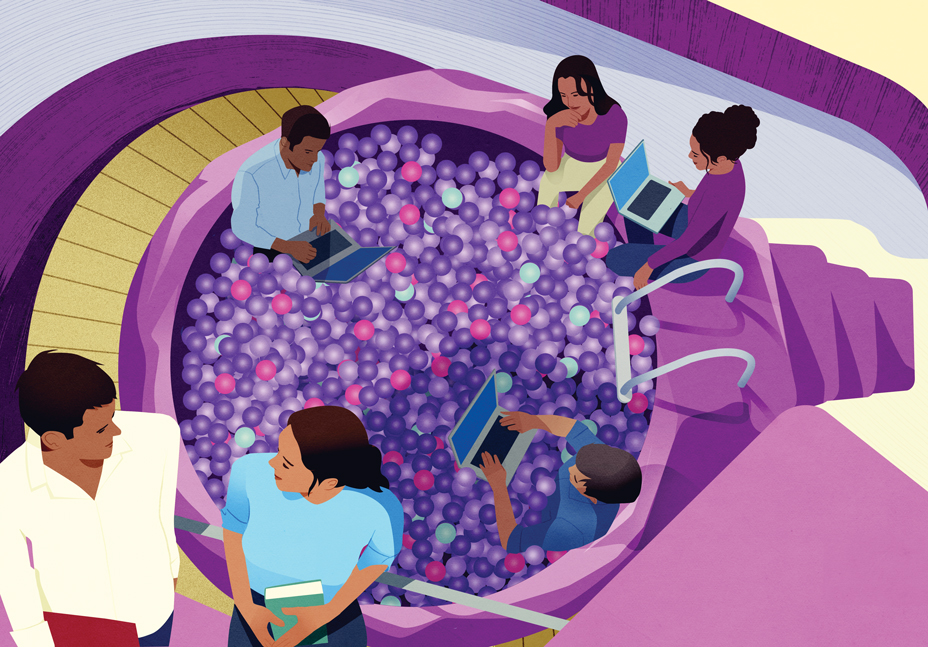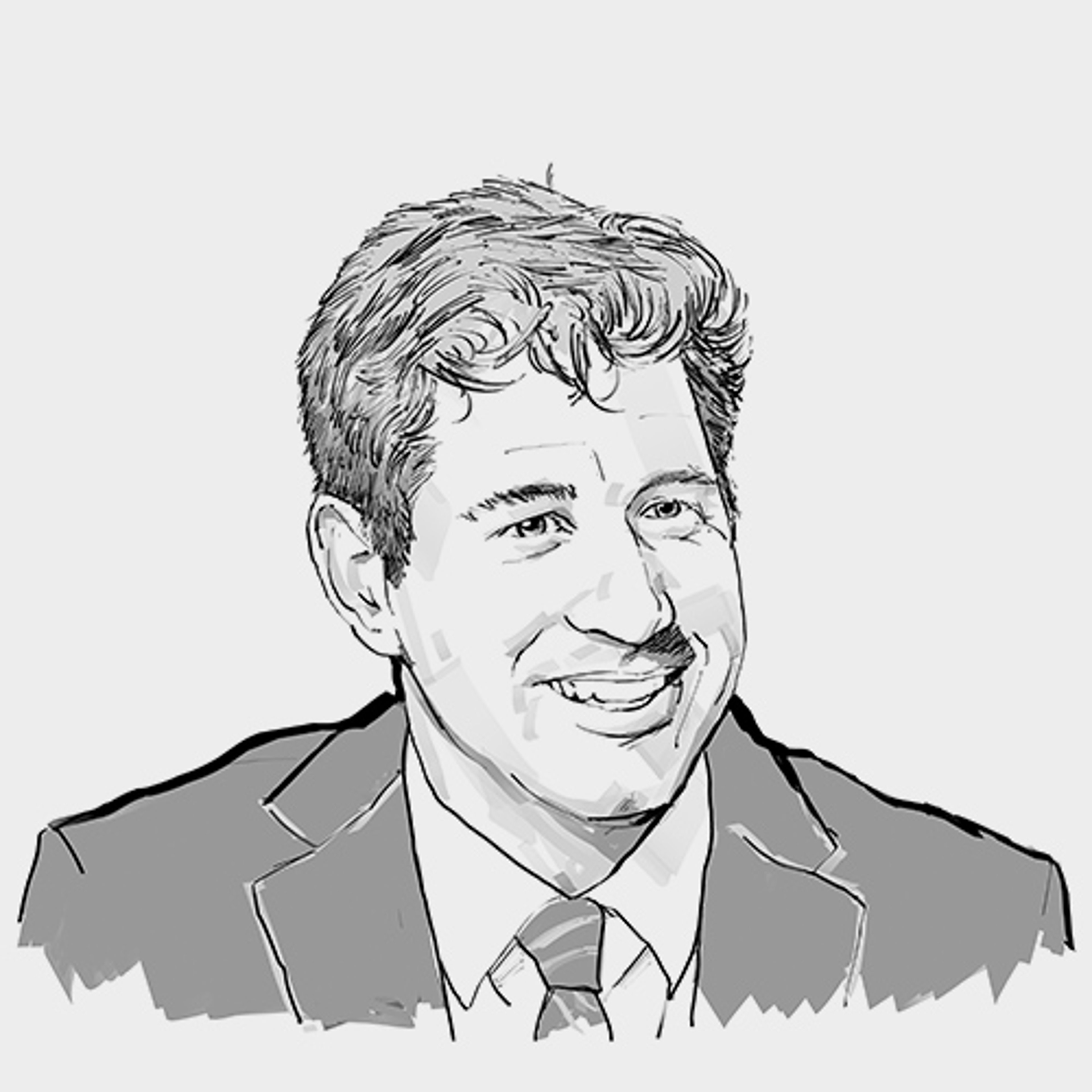
Illustration by Andrew Lyons
Please remember that the value of an investment can fall and you may not get back the amount invested. This article originally featured in Baillie Gifford’s Spring 2023 issue of Trust magazine.
Getting to Cantagalo’s hillside community involved a journey of stark contrasts. The nearest metro station is Ipanema, Rio de Janeiro’s glamorous beachside district that’s celebrated in song. Upon exiting, I walked past luxurious, gated apartment buildings before turning up a steep road and passing through police barriers. Suddenly I was in one of the city’s poorest quarters after what seemed like the briefest of transitions.
The place was buzzing. Children and stray dogs were everywhere. Workers were drilling holes and creating showers of metalwork sparks. Above, tangled power cables formed a web between packed, ramshackle homes. And all around, rubbish and other waste lay uncollected.
Areas like Cantagalo are sometimes called favelas. But many consider the term disrespectful and prefer comunidad.
In any case, foreign asset managers seldom visit. I went at the invitation of RioOnWatch, a not-for-profit organisation that empowers residents to document ways of life within the city’s poorer communities. It then shares this research with local decision makers and international development professionals.
Keystone Positive Change seeks to provide our clients with long-term growth by focusing on companies solving big, enduring problems. So this was an excellent place to test our assumptions about social development and to seek reassurance about existing and potential portfolio companies’ products and services.
For example, one local told me he wanted to use an educational app, but the price of mobile data prevented him from doing so.
Positive Change already invests in the US-based language and maths-teaching service Duolingo, for which this has implications. But I also had the cost challenge in mind when I paid an exploratory first visit to YDUQS, a publicly traded education specialist that targets students of all incomes. Its headquarters in another part of Rio looks a bit like a fort.
Brazil’s higher education system is expensive and serves the elite. In the past, YDUQS focused on providing in-person vocational courses to working-class students as an alternative. A government-guaranteed loan introduced by the left-wing President Lula in 1999 used to cover these. However, his successor radically scaled back the scheme as part of austerity cuts.
YDUQS subsequently switched focus to serving poorer students with digital classes, setting up hubs in rural areas, where it lends laptops and provides free wifi. The firm kept growing its revenues but more slowly than before.
However, with Lula’s return to power, there’s speculation that funding will flow back to the sector, favouring YDUQS and some of its contemporaries.
We haven’t made an investment decision on the firm, but our meeting gave me something extra to digest as I munched on a bowl of açaí during a visit to Sugarloaf Mountain. I’d previously sampled a powdered version of the Brazilian ‘superfruit’ in Scotland, where it’s sold as a health product. But I was startled at the earthy sweetness of the frozen pulped berries in this form. Brazilians are famous for having a sweet tooth, and I suspect the added sugar may have counteracted any benefits.
While Rio struck me as a free and airy city, São Paulo presented a more intense experience. It’s huge, packed with helipad-capped skyscrapers stretching as far as the eye can see. The 22 million people living in the city and surrounding metropolitan area make it South America’s most populous zone by a wide margin.
My key meeting there was with Nubank, an app-based lender operating in Brazil, Mexico and Colombia. The Trust has been an investor since 2021.
Brazil’s traditional lenders are notorious for high charges that effectively exclude large swathes of the population from having accounts.

That encourages many to borrow from friends, relatives and neighbours – which can put those parties’ finances under strain – or to turn to loan sharks instead.
Nubank first disrupted the market with a no-fee credit card eight years ago before expanding into other financial services, including savings, investments and life insurance.
One of the things I wanted to understand better was its management’s intent: whether executives were genuinely committed to serving low-income customers, as well as the company’s rising number of wealthier clients. We want it to do both because by becoming more profitable it can serve more people on the lower rungs of the earnings ladder. The worry would be if Nubank were interested in attracting poorer account holders only to swell its growth metrics.
I felt a pang of doubt upon entering its headquarters. Every other object was purple, the company’s corporate colour – coffee cups, a pool table, a giant ball pit and the merchandise in its newly opened store. Meanwhile, many of its youthful trainer-wearing staff looked like they belonged more to a hip Silicon Valley startup than to a socially focused enterprise. But I was reassured by a conversation with the bank’s global director of ESG (environmental, social and governance).
Christianne Canavero discussed financial education plans to ensure that the firm’s most vulnerable clients were better informed about risks and opportunities. And she shared details of a third-party study the bank had commissioned to check that its products reduced inequality as intended.
When I mentioned that the Trust had commissioned its own research into financial inclusion, it was also encouraging to hear that Nubank wanted to send a delegation to hear the results.
That led to a cramped meeting two days later at the offices of Plano CDE, the consultancy of academics we had hired to do the work. Officials from the country’s central bank also attended by video link. The focus was Brazil’s so-called CDE classes, roughly defined as individuals and families living on less than 2,000 reals (£335) per head a month. More than half of the country’s 217 million citizens meet the criteria.
Notable findings included that:
- 50 per cent spend more each month than their income
- 37 per cent have reduced their food shopping to pay off debts
- 65 per cent seek investment information from online influencers
Surprisingly, the study also indicated that more than a quarter of this group intended to invest in cryptocurrencies over the following year, putting crypto ahead of stocks, pensions and government bonds.
Nubank’s app is among those that let users do so. There’s nothing inherently wrong with crypto. But this was an important reminder of the firm’s need to offer it and other products responsibly.
A subsequent visit to Jardim Ângela provided supportive evidence. In 1999, the UN ranked the São Paulo suburb as having the world’s highest murder rate. These days it’s safer and on the rise, although it’s poorly served by public transport, among other challenges.

One Nubank customer I met was João, a 27-year-old community worker with a young family, who was saving money for the first time. He mentioned he had watched clips of online influencers advocating crypto. But he seemed more intrigued by Caixinhas.
This innovative Nubank facility lets users automatically pay savings into digital ‘money boxes’. Users assign each to a different goal, and progress bars show how close they are to affording the purchases.
I also stopped in at the neighbourhood’s healthcare centre. It was well-staffed, and patients didn’t need an appointment. But the problem comes when it refers them to a specialist.
Brazil’s public health system is free but suffers underfunding, long waiting times and poor coordination. About a quarter of Brazilians instead pay for private care, primarily through employee health plans.
As part of my trip, I visited several private healthcare providers. If they offered plans that were more affordable to low-income families, it would help take the strain off the overstretched public system.
But there are questions about whether they can do so profitably in some of Brazil’s more remote towns and cities. Moreover, any investment into the sector threatens to exacerbate inequality. So it’s an ethical dilemma.
The trip to Brazil made me recognise that some things remain outside the scope of a large asset manager whose primary responsibility is to protect clients’ capital.
That said, I do believe it’s an exciting place to invest.
There’s an old bossa nova song, less globally famous than The Girl From Ipanema, that’s still played in Brazil’s cafes and bars:
O morro não tem vez
Mas se derem vez ao morro
Toda a cidade vai cantar
Loosely translated, it means: ‘The slums on the hills are easily dismissed, but if given a voice, the whole city will sing.’
It matches our philosophy that investing in dynamic companies providing long-term opportunities to some of the world’s most disadvantaged citizens can benefit everyone, including our clients.
Important Information
The Trust invests in companies that make a positive impact on society and/or the environment. This means the Trust won’t invest in certain sectors and companies, limiting the investments available to the Trust. Therefore, the Trust’s returns may be different to a fund or trust which has no such restrictions.
Investments with exposure to overseas securities can be affected by changing stock market conditions and currency exchange rates.
The views expressed in this article should not be considered as advice or a recommendation to buy, sell or hold a particular investment. The article contains information and opinion on investments that does not constitute independent investment research, and is therefore not subject to the protections afforded to independent research.
Some of the views expressed are not necessarily those of Baillie Gifford. Investment markets and conditions can change rapidly, therefore the views expressed should not be taken as statements of fact nor should reliance be placed on them when making investment decisions.
Baillie Gifford & Co Limited is wholly owned by Baillie Gifford & Co. Both companies are authorised and regulated by the Financial Conduct Authority and are based at: Calton Square, 1 Greenside Row, Edinburgh EH1 3AN.
The investment trusts managed by Baillie Gifford & Co Limited are listed on the London Stock Exchange and are not authorised or regulated by the Financial Conduct Authority.
A Key Information Document is available by visiting bailliegifford.com





